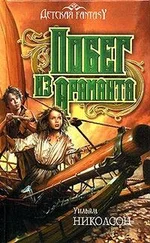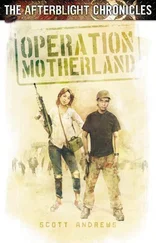* * *
The newly-weds have booked a week’s leave for their honeymoon, which they take in Brighton.
The Old Ship Hotel is one of the few on the seafront that hasn’t been requisitioned for war personnel. The hotel is very rundown, its paintwork cracking and its wallpaper peeling. The only porter is old and sick. A girl called Milly offers to carry their bags up to their room, but Ed says he can manage. The stairs creak as they climb.
The room has a double bed, and a window that looks out over the promenade. Outside they can see the beach with its concrete anti-tank blocks and its undulations of rolled barbed wire.
‘The beach will be mined,’ Ed says. ‘We won’t be going swimming.’
The Palace Pier is deserted, its walkway broken in the middle so that it can’t be used as a landing stage. The seafront is under curfew by the time they arrive. The sea gleams in the light of a golden summer evening, but there’s nobody about.
‘Maybe we should have gone to a B&B in the countryside,’ says Ed.
‘I don’t care where we are,’ says Kitty.
Ed is quiet, looking round the shabby room. He seems to be almost at a loss.
‘What is it, Ed?’
‘I wanted everything to be perfect for you,’ he says.
‘And for you too.’
‘Oh, I don’t mind. So long as I’ve got you.’
‘Well, you have got me. You’d better think of something to do with me.’
He takes her in his arms. She leans her body against his.
‘I love you so much, Kitty.’
‘Just as well.’
‘I love you so much I can’t think or move or hardly even breathe.’
‘That’s too much,’ Kitty says. ‘You’d better love me less and breathe more.’
He kisses her.
Later they lie in bed together, and every time they move the bed makes a pinging noise. They try to stay still but it isn’t easy. They start moving again and the pinging returns. They try lying in different places on the bed, and find one position, right on the edge, that almost silences the noisy bed-spring, but it’s hard not to fall off.
Ed stops moving, holding Kitty close in his arms.
‘We have a choice,’ he says. ‘We lie doggo, or we jangle.’
‘Let’s jangle,’ she says.
* * *
On Sunday morning they walk along the seafront as far as the big Bofors gun outside the Grand Hotel. A crowd of Canadian soldiers are playing football on the promenade, using kitbags for goalposts. Kitty holds Ed’s arm and leans a little against him as they walk, and loves him so much it hurts. The sun shines on the sea, and on the patches of black tar on the pebbles under the barbed wire, and on the dull metal of the big gun. Ahead the West Pier has been severed like its sister. Across the water lies France.
I’m married, thinks Kitty. He belongs to me now. His body belongs to me.
She loves his body. She loves the feel of it pressed against hers all the way down. She wants to tell him so but there seem to be no words and she’s shy. So instead she squeezes his arm and strokes the small of his back. They come to a stop by the Bofors gun and kiss. The soldiers playing soccer pause in their game to clap.
* * *
Later that Sunday afternoon all leave is cancelled and all personnel are recalled to their units. On Tuesday August 18th Admiral Lord Mountbatten, Commander-in-Chief Combined Operations, gives the order for Operation Jubilee, the largest military assault on mainland Europe since the disaster of Dunkirk.
10
It’s a clear night, and the sea is calm. Larry is up on deck with Johnny Parrish to escape the thick fog of tobacco smoke below. He looks through a gap in the tarpaulin at the dark coast of England as it recedes. On either side of the troopship other craft reach as far as the eye can see, their low rumble filling the night. Bulbous transport ships carrying invasion barges; tank landing craft lying low in the water; the sleek forms of destroyers.
‘Bloody big show,’ says Johnny.
Over the lapping of the waves against the hull they hear the sound of a motorboat drawing alongside.
‘That’ll be the CO,’ says Johnny. ‘Better get below.’
The troop deck is packed and buzzing with excitement. Larry joins the crowd of officers by the companionway. Shortly after, the brigadier enters, with General Ham Roberts. Roberts wastes no time in preliminaries.
‘We’re on our way, men,’ he says. ‘You’ve been told this is another training exercise. Well, it isn’t. This is the real thing.’
A great shout goes up from the mass of soldiers, followed by hoots and cheers. The officers look at each other and grin.
‘Our destination is Dieppe. We will land at dawn, hold the port for a maximum of twelve hours, and withdraw. This is not an invasion. This will be the very first reconnaissance in force of the enemy mainland. The port of Dieppe is well defended. This isn’t going to be a picnic. But it’s our first chance in this war to get a poke at the Hun. So let’s see we give him a poke he won’t forget.’
The men cheer again. Roberts departs, to repeat his short speech on the next ship in the great armada.
Larry retreats to the wardroom, where he and the crowd of other officers are joined shortly by Brigadier Wills. Orders are now opened and given out, complete with maps, schedules, and aerial photographs. Jevons talks them through the plan.
‘RAF air cover will be in place by dawn. Naval bombardment of the beaches will begin at 0510 hours. At 0520 hours our landing craft will hit Red Beach, here. Our mission is to seize and hold the Casino, which is here.’
Larry listens attentively. The plan is so detailed, so specific, that it has an air of inevitability. But what is it all for? Why are they to attack this fortified port, and then go home again? All round him, beneath the grave faces and the air of businesslike concentration, he feels wild pulsing excitement. They’re going into battle. No one asks to measure the risk against the reward. All they require is the assurance that the cause is just.
‘Just point us at ’em,’ the men say, ‘and leave us to do the rest.’
Larry feels it too, but he doesn’t yet understand it. All he knows is it’s nothing to do with love of England, or hatred of Germany. He isn’t on this mission because he wants to die for his country. He’s here because his whole world is on the march, and it has become impossible to stand on the margins and watch the parade go by. He sees on the faces of the men around him the same conviction that possesses him: we’re on our way at last.
* * *
Shortly after midnight the fleet enters a minefield. The order goes out for all men to inflate their lifejackets. The command ship, the Hunt-class destroyer HMS Calpe , enters the minefield first, following the channel cleared by navy sweepers. The convoy falls in behind, guided by the faint green lights of marker buoys.
Larry stands at the ship’s rail on the open deck, now packed tight with silent men. All watch the white froth of the ship’s wake as the engines drive them fast through the danger zone.
‘The old man’s gone through first,’ says a voice. ‘He’s got guts, give him that.’
‘They lay these magnetic mines,’ says another. ‘You don’t have to hit them. They come and hit you.’
‘Just like me and the girls.’
‘Me, I’m old-fashioned. I like to hit the girls first.’
Subdued laughter ripples outwards in the night. The ship veers suddenly to starboard and the men fall silent. Then the ship veers again, to port. A light on the water ahead comes nearer, and then passes away into the darkness.
A bell jangles. Voices and laughter break out again. The troopship is safely through the minefield. The tension lifts. Brigadier Wills, doing the rounds, finds Larry still leaning on the rail.
Читать дальше












